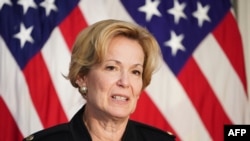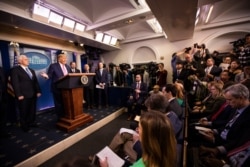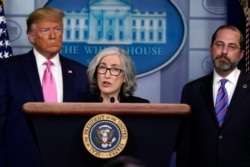U.S. Vice President Mike Pence on Thursday named Debbie Birx, an international health expert, to be the White House coronavirus response coordinator, lending new expertise to the government's effort to combat the spread of the illness in the country.
Birx is a physician and as a U.S. ambassador-at-large in the State Department currently heads the government's effort to combat the global spread of HIV/AIDS.
She will report to Pence, named by President Donald Trump on Wednesday to oversee the U.S. government response to the global health crisis, and join the coronavirus task force led by Health and Human Services secretary Alex Azar. Birx is a career government official who was nominated to the AIDS portfolio by former President Barack Obama, a Trump political foe.
In a statement, Pence described Birx as a "scientist, physician, and mom, with three decades of public health expertise, including virulent diseases, their vaccines, and inter-agency coordination. She has been utilizing the best science to change the course of the HIV pandemic and bring the pandemic under control, community by community and country by country."
The vice president added, "Three different administrations across both political parties have relied on her knowledge and judgment."
US numbers
The appointment came a day after Trump downplayed coronavirus concerns in the U.S. even as government health officials say that the question is not whether the virus will spread into the U.S. but when and how many people will be severely affected.
"I don't think it's inevitable," Trump told reporters at the White House. "It probably will. It possibly will. It could be at a very small level or could be at a larger level. Whatever happens, we're totally prepared."
He added that "the risk to the American people remains very low."
Trump's comments came after officials from the Centers for Disease Control and Prevention warned Tuesday of the inevitability of the spread of the virus into the U.S.
So far, there are 60 total cases in the United States. Three are people who had been in Wuhan, China, the center of the outbreak, while 42 were brought back to the United States after being on board a cruise ship where hundreds of people became sick as it sat in quarantine off Japan.
Health officials are concerned about what they call "community spread," or instances of people being infected without knowing how or where.
The CDC reported Wednesday one such possible case, with a positive test for the virus in a person in California who reportedly did not have a history of travel to areas where the virus is spreading or to another known infected patient.
Containment efforts
Dr. Anthony Fauci, who leads the National Institute of Allergy and Infectious Diseases, said at the White House news conference that while work to develop a vaccine for the coronavirus is ongoing, the process of testing to make sure it works and is safe will take months to a year to complete. That means a vaccine could be effective if there is another outbreak in a year, but for this one, Fauci said public health measures are the way to contain it.
Dr. Anne Schuchat, the principal deputy director of the Centers for Disease Control and Prevention, said containment efforts have thus far been working in the United States, but that the agency expects more cases and that it is a good time for the American public to prepare.
"The coronavirus that we're talking about is a respiratory virus," she said. "It's spread in a similar way to the common cold or to influenza. It's spread through coughs and sneezes, so those everyday, sensible measures that we tell people to do with the flu are important here — covering your cough, staying home when you're sick, and washing your hands."
Trump lauded his administration's decision to restrict entry to non-U.S. citizens traveling from China as a measure that has helped keep U.S. exposure low. When asked if he would do the same for Italy and South Korea, two of the hardest-hit areas outside of China, Trump said he may take that step but that now is not the right time.
The president has asked Congress for $2.5 billion to meet the coronavirus challenge. Earlier Wednesday, Senate Minority Leader Chuck Schumer proposed $8.5 billion for the effort after criticizing Trump's request as too little, too late to meet the challenge.
Opposition Democrats criticized Trump's choice of Pence to head the government's effort fighting coronavirus. They pointed to Pence's time as governor of Indiana in 2015 when the state faced a surge in HIV cases and state law at the time prohibited needle exchanges, a policy that health experts said exacerbated the outbreak. Pence, who opposed the exchanges, eventually signed a new law allowing them in some cases.







